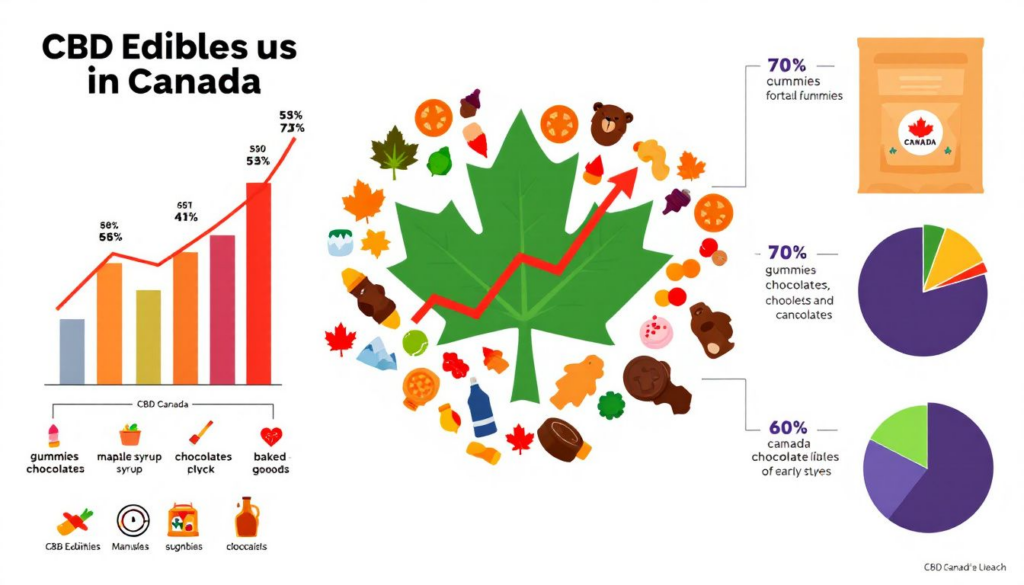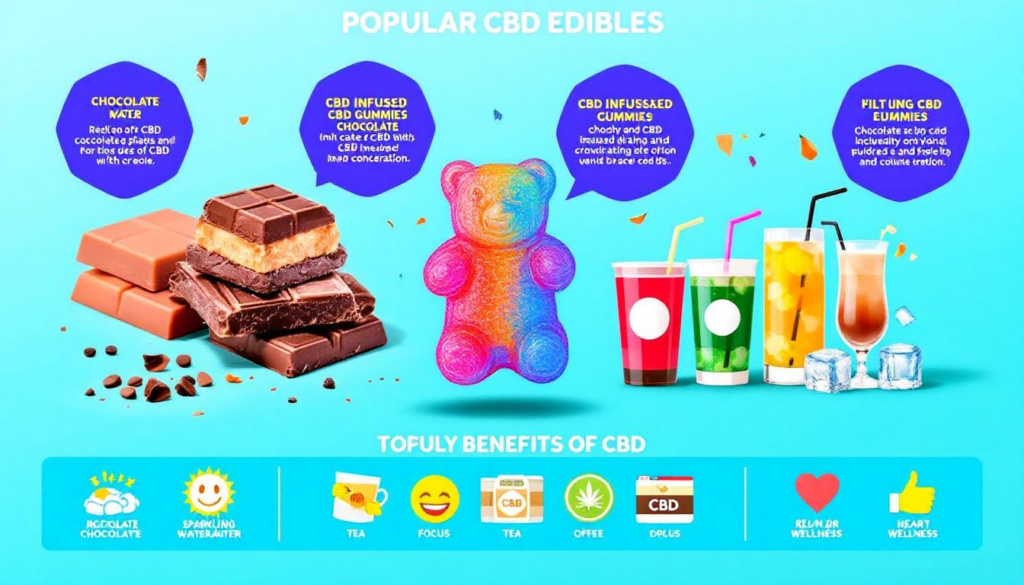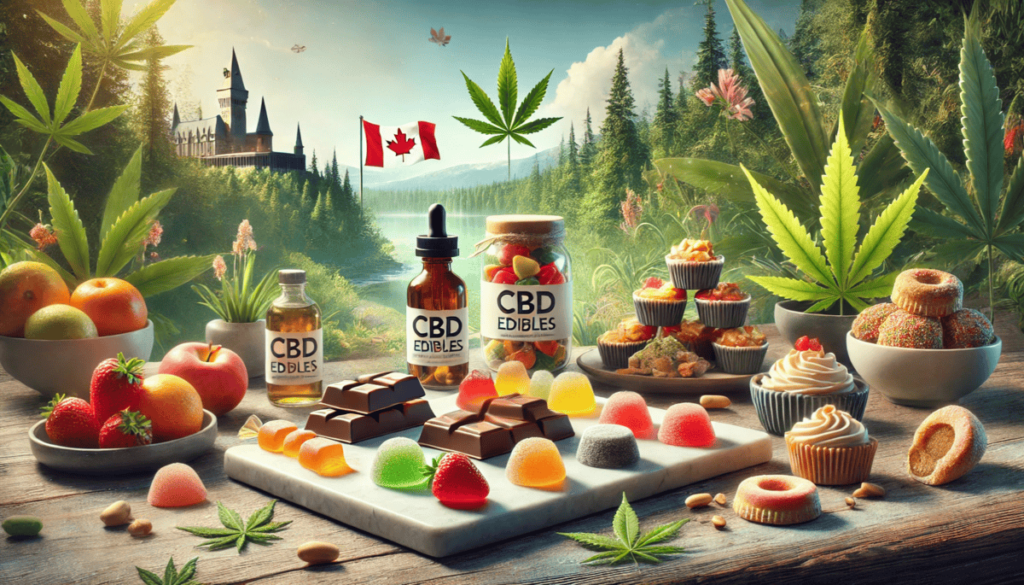Edibles
The Rise of CBD Edibles in Canada: What You Need to Know Today
CBD edibles are on the rise in Canada, offering a tasty and convenient way to enjoy CBD. In this context, “the rise of CBD edibles in Canada: what you need to know” includes their various forms, such as gummies and beverages. This article covers what you need to know about their legal status, health benefits, and market trends.
Key Takeaways
- CBD edibles are rapidly gaining popularity in Canada, offering a range of forms and health benefits without the drawbacks of smoking or vaping.
- The market for CBD edibles is projected to reach USD 33.17 billion by 2032, driven by increased consumer awareness and post-pandemic demand for health products.
- Key players like Twisted Extracts and Savage CBD emphasize quality and consistency, while educational initiatives are crucial for consumer understanding of dosages and product effects.
The Rise of CBD Edibles in Canada: What You Need to Know

CBD edibles have taken the Canadian market by storm, coming in various forms such as beverages, gummy candies, dissolvable strips, baked goods, and even cotton candy. Their appeal lies not just in their diverse forms but also in their ability to provide the benefits of CBD infused products without the drawbacks associated with smoking or vaping cannabis products.
The recommended dosage for CBD edibles varies, typically suggesting 1 to 6 mg of CBD per 10 pounds of body weight. This careful dosing ensures that consumers can tailor their intake to their specific needs, making it easier to experience the benefits of CBD without any adverse effects.
Leading brands like Twisted Extracts and Savage CBD have made significant strides in this market, focusing on quality and consistency. Their products, particularly CBD gummies, are favored for their fun, tasty nature and ease of use. This combination of quality, diversity, and consumer-friendly options has fueled the rise of CBD edibles across Canada.
Introduction
Understanding the driving forces behind the rising popularity of CBD edibles in Canada is crucial. The market has seen significant growth, driven by a growing awareness of the health benefits associated with CBD and the evolving legal landscape.
This article aims to offer a comprehensive overview of CBD edibles, covering their legal status, health benefits, and market trends. These insights will help you navigate this dynamic and rapidly evolving market.
Understanding CBD Edibles

CBD edibles are legal edibles and cannabis products designed to be consumed like food. They come in a variety of forms, including beverages, gummy candies, dissolvable strips, baked goods, and even cotton candy. These products offer a convenient and often more enjoyable way to consume CBD compared to traditional methods like smoking or vaping.
CBD edibles provide longer-lasting effects compared to inhaled cannabis, which delivers immediate effects. Edibles may take longer to kick in but offer sustained relief, making them ideal for managing chronic pain or anxiety. Additionally, cbd oil can complement the benefits of cbd edibles.
Brands like Twisted Extracts and Savage CBD have captured the market’s attention by emphasizing quality and flavor. Consumers are increasingly drawn to tasty and flavorful options like gummies and cannabis-infused chocolate bars. As a non-intoxicating compound, CBD offers the benefits of cannabis without the high associated with THC.
Legal Landscape of CBD Edibles in Canada
The Cannabis Act governs the regulatory framework for CBD edibles in Canada, defining them as products intended for consumption similar to food, excluding dried or fresh cannabis. Health Canada evaluates whether a product is classified as edible cannabis based on its format, sensory characteristics, and historical use.
Products that resemble food in taste, smell, or appearance are more likely to be classified as edible cannabis. Licence holders must ensure their products are correctly classified and comply with the Cannabis Act and its regulations. Non-compliance can lead to enforcement measures by Health Canada to protect public health.
Post-legalization, the regulatory environment has positively influenced the distribution of CBD products in Canada. This framework ensures that consumers have access to safe and properly regulated CBD edibles, fostering trust and confidence in the market.
Health Benefits of Consuming Edibles

CBD is recognized for its potential to alleviate anxiety, depression, and pain. Chronic pain relief is a primary health benefit of CBD edibles, supported by scientific evidence and user testimonials. CBD gummies, in particular, are reported to help reduce anxiety and improve sleep quality.
Anecdotal evidence suggests that CBD may help reduce inflammation, enhancing its appeal as a natural remedy. However, the effectiveness of CBD products can vary due to differences in strength and purity.
With growing demand for information on the health benefits of CBD edibles, consumer education becomes crucial. Educating consumers about proper dosages and potential benefits helps them make informed decisions and avoid adverse effects.
Market Trends and Growth Opportunities
The CBD edibles market is set for significant growth, projected to reach USD 33.17 billion by 2032. Rising demand for health and wellness products, especially post-coronavirus pandemic, drives this growth. The market’s compound annual growth rate (CAGR) is estimated at 16.80% from 2023 to 2032.
The CBD gummies market is growing rapidly, with a projected CAGR of 26% from 2023 to 2033. Increasing rates of anxiety and depression have fueled interest in CBD products, driving this demand. The popularity of CBD products for pets, like CBD dog treats, represents an emerging opportunity in the cbd market.
Prominent North American companies like Canopy Growth Corp and Aurora Cannabis Inc. are expected to drive expansion through regulatory compliance and heightened user awareness. Increasing raw material availability and eCommerce platform development are boosting demand for CBD edibles.
Popular Types of CBD Edibles

Offering a wide range of flavors and forms, the CBD edibles market caters to diverse consumer preferences. Popular types of CBD edibles include infused drinks, brownies, cookies, and, most notably, gummies.
CBD gummies have gained immense popularity, with the global market reaching a valuation of USD 743.5 million in 2023. High CBD concentrated gummies contributed significantly, showcasing their demand and appeal in this growing sector.
Challenges Facing the CBD Edibles Market
Despite the market’s growth and potential, challenges persist. Regulatory hurdles, such as strict dosage limits and financial burdens, pose significant obstacles. In Canada, CBD edibles are limited to a maximum dosage of 10 mg per package, which some consumers find restrictive. High excise duties and licensing fees add financial strain, particularly for smaller craft producers.
Marketing restrictions hinder manufacturers from effectively reaching and educating targeted consumer demographics. Innovative solutions are needed to overcome these challenges and ensure market research growth.
Key Players in the Canadian CBD Edibles Market
Key players like Twisted Extracts and Savage CBD dominate the Canadian CBD edibles market, known for their quality and consistency. Other notable companies include Pure Kana, CV Sciences, Canopy Growth Corp, and Aurora Cannabis Inc.
The competitive landscape features both established companies and innovative newcomers, driving growth and consumer interest. Pure Kana’s acquisition of ‘BUDAPETS’ in February 2021 expanded its CBD edibles portfolio, highlighting the market’s dynamic nature.
Distribution Channels for CBD Edibles
CBD edibles are available through multiple sales channels, including hypermarkets, supermarkets, convenience stores, specialty stores, and online retail. Online retail has emerged as the dominant sales channel, accounting for 60% of market revenue.
The proliferation of online platforms has significantly contributed to the market’s growth. As reliance on digital platforms increases, online retailing will continue to play a significant role in CBD edibles’ sales and distribution.
Consumer Awareness and Education
Educating consumers about the benefits and safe consumption of CBD edibles is vital for market growth. Proper dosage information helps avoid potential adverse effects and ensures a positive experience. Clear labeling of CBD products allows consumers to make informed health and wellness choices.
Understanding the differences between CBD and THC helps consumers select the right product for their needs. New users are generally advised to start with a low dose and gradually increase it as needed.
Consumer education enhances market growth and helps build trust and confidence among users. Brands can foster a more informed and satisfied consumer base by providing accurate and accessible information.
Future Outlook for CBD Edibles in Canada

The future of CBD edibles in Canada looks promising, with increased consumer demand and evolving regulations driving market growth. Health Canada is expected to update regulations, potentially allowing the introduction of more diverse CBD edible products. Manufacturers will likely explore new formulations and flavors, leading to innovative product offerings.
E-commerce will continue to play a significant role in distributing CBD edibles as online shopping trends grow. As the market evolves, consumers can expect a wider range of high-quality CBD edibles catering to various preferences and needs. This dynamic growth presents exciting opportunities for consumers and industry players alike.
Summary
In summary, the CBD edibles market in Canada is on an upward trajectory, driven by increasing consumer interest, regulatory support, and the health benefits associated with CBD. From understanding the legal landscape to exploring market trends and growth opportunities, this blog post has provided a comprehensive overview of the current state and future potential of CBD edibles.
As we look ahead, the continued evolution of regulations, innovative product offerings, and the expansion of e-commerce will shape the future of the market. Embracing these changes will enable both consumers and producers to fully realize the benefits of this burgeoning industry.
Frequently Asked Questions
What are CBD edibles?
CBD edibles are food products infused with cannabidiol, designed for consumption and available in various forms such as gummies, baked goods, and beverages. They provide a convenient way to experience the potential benefits of CBD.
What are the health benefits of CBD edibles?
CBD edibles may help reduce anxiety, alleviate chronic pain, and improve sleep quality. Incorporating them into your routine could enhance overall well-being.
How are CBD edibles regulated in Canada?
CBD edibles in Canada are regulated under the Cannabis Act, with Health Canada responsible for evaluating and classifying products based on their format, sensory characteristics, and historical use. It ensures a consistent and safe approach to CBD consumption.
What are the challenges facing the CBD edibles market?
The CBD edibles market faces significant challenges such as regulatory hurdles, dosage limits, financial burdens, and marketing restrictions. Addressing these issues is vital for the industry’s growth and success.
What is the future outlook for CBD edibles in Canada?
The future outlook for CBD edibles in Canada is promising, driven by rising consumer demand, evolving regulations, and innovative product expansion. This trend suggests significant growth potential for the market.

